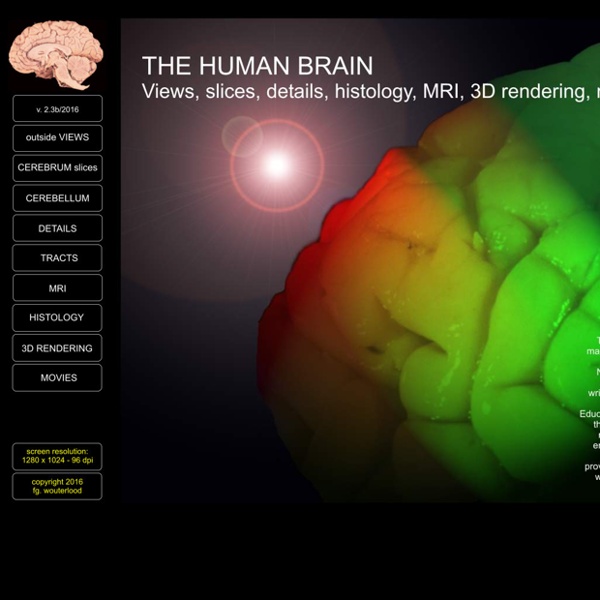



http://www.anatomie-amsterdam.nl/sub_sites/anatomie-zenuwwerking/123_neuro/start.htm
Related: LearningFLP Vol. I Table of Contents Dear Reader, There are several reasons you might be seeing this page. In order to read the online edition of The Feynman Lectures on Physics, javascript must be supported by your browser and enabled. If you have have visited this website previously it's possible you may have a mixture of incompatible files (.js, .css, and .html) in your browser cache.
The Age Of Insight Eric Kandel is a titan of modern neuroscience. He won the Nobel Prize in 2000 not simply for discovering a new set of scientific facts (although he has discovered plenty of those), but for pioneering a new scientific approach. As he recounts in his memoir In Search of Memory, Kandel demonstrated that reductionist techniques could be applied to the brain, so that even something as mysterious as memory might be studied in sea slugs, as a function of kinase enzymes and synaptic proteins.
Cranial Nerves - StumbleUpon Can't remember the names of the cranial nerves? Here is a handy-dandy mnemonic for you: On Old Olympus Towering Top AFamous Vocal German Viewed Some Hops. The bold letters stand for: Psychological ("personality") Types Psychological ("personality") Types According to Jung's theory of Psychological Types we are all different in fundamental ways. One's ability to process different information is limited by their particular type. These types are sixteen. People can be either Extroverts or Introverts, depending on the direction of their activity ; Thinking, Feeling, Sensing, Intuitive, according to their own information pathways; Judging or Perceiving, depending on the method in which they process received information. Extroverts vs.
Making Mouse Memories In the movie Eternal Sunshine of the Spotless Mind, scientists erase troubling memories from Jim Carrey’s head. In real life, scientists have done the opposite. By reactivating certain nerve cells, researchers make artificial memories pop into mice’s heads. Top 40 Useful Sites To Learn New Skills The web is a powerful resource that can easily help you learn new skills. You just have to know where to look. Sure, you can use Google, Yahoo, or Bing to search for sites where you can learn new skills , but I figured I’d save you some time. Here are the top 40 sites I have personally used over the last few years when I want to learn something new.
Brain 'entanglement' could explain memories - life - 12 January 2010 Subatomic particles do it. Now the observation that groups of brain cells seem to have their own version of quantum entanglement, or "spooky action at a distance", could help explain how our minds combine experiences from many different senses into one memory. Previous experiments have shown that the electrical activity of neurons in separate parts of the brain can oscillate simultaneously at the same frequency – a process known as phase locking . Why You’re Not Who You Think You Are In his fascinating book Situations Matter: Understanding How Context Transforms Your World, psychology professor and researcher Sam Sommers, Ph.D, reveals the big impact context has on public behavior — how we think about others and even how we think about ourselves. According to Sommers, “Even the most private of perceptions — our very sense of self — is shaped by where we are and who we’re with, though we may resist this notion.” Our Iffy Introspection Complete this statement five times: “I am _____________.”
Stephen Cave - Stayin' alive A group of American psychologists has discovered a simple way of turning ordinary people into fundamentalists and ideologues. Their method requires neither indoctrination nor isolation nor any form of brainwashing; indeed, it can be done anywhere and in a matter of minutes. It is just this: the researchers remind these ordinary folks that they will one day die. In one experiment, for example, the psychologists asked a group of Christian students to give their impressions of the personalities of two people.
12 great free online courses Much ado has been made in recent years over the quickly rising cost of healthcare in the United States. But the cost of college tuition and fees has skyrocketed at nearly twice that rate. Going to college today will cost a student 559% more than it did in 1985, on average. Brain scans support findings that IQ can rise or fall significantly during adolescence IQ, the standard measure of intelligence, can increase or fall significantly during our teenage years, according to research funded by the Wellcome Trust, and these changes are associated with changes to the structure of our brains. The findings may have implications for testing and streaming of children during their school years. Across our lifetime, our intellectual ability is considered to be stable, with intelligence quotient (IQ) scores taken at one point in time used to predict educational achievement and employment prospects later in life. However, in a study published October 20 in the journal Nature, researchers at the Wellcome Trust Centre for Neuroimaging at UCL (University College London) and the Centre for Educational Neuroscience show for the first time that, in fact, our IQ is not constant. The researchers, led by Professor Cathy Price, tested 33 healthy adolescents in 2004 when they were between the ages of 12 and 16 years.
Visions For All Meeting the Almighty takes hallucinatory talent and training. And Hannah, a member of the Vineyard Christian Fellowship, has got it down. Per-Eric Berglund/The Image Bank/Getty Images HEARING VOICES A recent study looked at what characteristics of auditory hallucinations were shared and which differed among healthy participants and psychotic patients. Members of both groups hallucinated at least once a month.